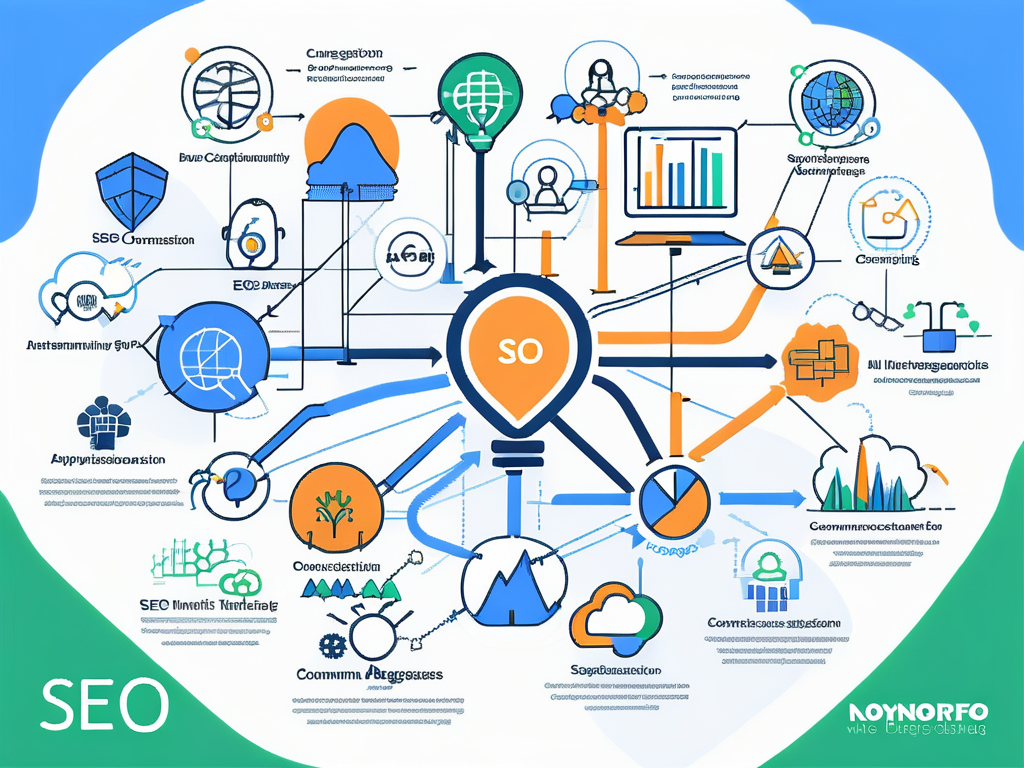The Beginner’s Guide to SEO for Nonprofits
In an increasingly digital world, nonprofit organizations must establish their online presence to engage with their audiences effectively. Search Engine Optimization (SEO) is a vital tool in achieving this goal. This guide is tailored for nonprofits to help them understand and leverage SEO for their missions.
Understanding SEO: A Nonprofit Perspective
SEO, or Search Engine Optimization, refers to the practices used to enhance a website’s visibility in search engine results. For nonprofits, effectively utilizing SEO can enhance outreach, attract donors, and increase engagement. By understanding SEO from a nonprofit perspective, organizations can better serve their communities and advance their causes.
What is SEO and Why is it Important?
SEO encompasses various techniques aimed at improving a website’s ranking on search engines like Google. These techniques include keyword optimization, content creation, and link building. For nonprofits, SEO is essential because it helps reach potential supporters who are searching for related services or causes. A higher search ranking translates to more visibility, which can lead to increased donations and community support.
Moreover, effective SEO helps establish credibility and trust. When a nonprofit consistently appears at the top of search results, it signals to users that the organization is a reputable source, which can enhance its reputation within the community. This trust is particularly important for nonprofits, as they often rely on the goodwill of the public and donors who want to ensure their contributions are going to a worthy cause.
In addition, SEO can significantly impact a nonprofit’s ability to communicate its mission and values. By optimizing their content with relevant keywords and phrases, organizations can ensure that their messaging resonates with the right audience. This not only helps in attracting new supporters but also in retaining existing ones, as they feel more connected to the cause through well-articulated and easily accessible information.
How SEO Works: The Basics
At its core, SEO operates through a variety of ranking factors used by search engines to determine the relevance of web pages to specific queries. These factors include:
- Keywords: The words and phrases that users enter into search engines.
- Content Quality: Search engines favor high-quality, informative content that meets user needs.
- Backlinks: Links from other reputable sites can enhance credibility and visibility.
- User Experience: Easy navigation and a mobile-responsive design help retain visitors.
By focusing on these elements, nonprofits can improve their search rankings and drive traffic to their websites. Additionally, it’s crucial for nonprofits to regularly update their content to reflect current events, initiatives, and community needs. This not only keeps the website fresh and engaging but also signals to search engines that the organization is active and relevant, further boosting their SEO efforts.
Furthermore, utilizing social media platforms can complement SEO strategies. By sharing content and engaging with followers on social media, nonprofits can generate traffic back to their websites, which can positively influence search rankings. The interplay between social media presence and SEO is a powerful tool that nonprofits can leverage to maximize their outreach and impact within their communities.
Tailoring SEO Strategies for Nonprofits
Every nonprofit has its unique mission and audience; therefore, SEO strategies should be tailored accordingly. Understanding the specific needs and interests of your target audience is pivotal to developing effective SEO tactics. This means not only recognizing the demographic characteristics of your supporters but also delving into their motivations and values. By aligning your content with what resonates with your audience, you can foster deeper connections and encourage greater engagement with your cause.

Identifying Your Nonprofit’s Keywords
Keyword research is a foundational aspect of SEO. To identify relevant keywords, nonprofits should consider what terms potential supporters might use when searching for related information. Utilizing tools like Google Keyword Planner can help discover words and phrases that are both relevant and have adequate search volume. Additionally, engaging with your community through surveys or social media can provide insights into the language they use and the topics they care about most.
For example, if your nonprofit focuses on environmental conservation, relevant keywords could include “eco-friendly initiatives,” “sustainable practices,” or “community cleanup events.” By integrating these keywords into your website’s content, you can attract more organic traffic. Furthermore, consider long-tail keywords, which are more specific phrases that may have lower search volume but often result in higher conversion rates as they target users who are further along in the decision-making process.
Optimizing Your Nonprofit’s Website for SEO
Once you’ve identified your keywords, it’s essential to optimize your website accordingly. This includes incorporating keywords into titles, headers, and throughout your content without sacrificing readability. Additionally, consider the following:
- Meta Descriptions: Craft compelling meta descriptions that summarize your content and encourage clicks.
- Alt Text: Use descriptive alt text for images to improve accessibility and indexing by search engines.
- Site Speed: Ensure your website loads quickly to retain visitors and reduce bounce rates.
By implementing these strategies, your nonprofit can significantly improve its search engine ranking and online visibility. Beyond these technical aspects, it’s also crucial to create high-quality, engaging content that tells your organization’s story. This could include blog posts highlighting your recent projects, testimonials from beneficiaries, or informative articles that educate your audience about the issues you address. Such content not only boosts your SEO but also builds trust and credibility within your community, encouraging more individuals to support your mission.
Content Creation and SEO
Creating high-quality, engaging content is central to effective SEO practices. Quality content not only boosts search engine rankings but also fosters trust and engagement with your audience.

The Role of Quality Content in SEO
Search engines prioritize websites that publish valuable, relevant, and original content. For nonprofits, this can involve sharing success stories, educational articles, or updates on community projects. Quality content helps convey your mission and values, allowing potential supporters to connect with your cause personally.
Additionally, effective content can encourage social sharing, further broadening your reach and visibility. This added exposure can lead to more donations and volunteers for your organization. Engaging narratives about the people and communities you serve can create a powerful emotional connection, prompting readers to share your message with their networks. The more your content resonates, the more likely it is to be shared, which can significantly enhance your online presence and credibility.
SEO-Friendly Content Tips for Nonprofits
To create SEO-friendly content, consider these guidelines:
- Use Keywords Naturally: Incorporate keywords seamlessly into your writing.
- Break Up Text: Use headings, bullet points, and short paragraphs to improve readability.
- Include Call-to-Actions: Encourage readers to take action, whether it be donating, volunteering, or sharing your content.
By following these tips, nonprofits can maximize their content effectiveness and SEO impact. Moreover, it’s crucial to regularly update your content to keep it fresh and relevant. Search engines favor websites that frequently add new information, so consider maintaining a blog or news section on your site. This not only helps with SEO but also positions your organization as a thought leader in your field, providing valuable insights and updates that can engage your audience over time.
Furthermore, incorporating multimedia elements such as images, videos, and infographics can enhance the user experience and keep visitors on your site longer. These elements can illustrate your impact and mission more vividly than text alone, making your content more shareable and appealing. When optimizing multimedia, remember to use descriptive alt tags and captions, as these can also contribute to your SEO strategy and improve accessibility for all users.
Link Building for Nonprofits
Link building is a vital aspect of SEO that involves acquiring hyperlinks from other websites to your own. These backlinks serve as endorsements, signaling to search engines that your content is credible and valuable.

Understanding the Importance of Link Building
Link building is crucial for increasing your nonprofit’s authority and ranking in search engine results. When reputable websites link to your content, it indicates that your organization is a trusted source within the community and the larger field. This, in turn, can lead to more visitors and potential supporters.
Moreover, backlinks can drive referral traffic from other sites, expanding your audience and fostering connections with like-minded organizations.
Strategies for Effective Link Building
To build effective backlinks, nonprofits can employ several strategies:
- Collaborate with Other Nonprofits: Partnering for joint initiatives can lead to mutual link sharing.
- Guest Blogging: Writing articles for other organizations’ blogs can provide valuable backlinks.
- Create Shareable Resources: Develop infographics, guides, or reports that others may want to reference or share.
By implementing these strategies, nonprofits can enhance their link profile and boost their search rankings.
Monitoring and Improving Your SEO Efforts
SEO is not a one-time task but an ongoing process. To ensure your strategies are effective, it’s essential to monitor performance and make necessary adjustments.
Tools for Tracking SEO Performance
Several tools can help nonprofits track their SEO progress. Google Analytics is a powerful tool for monitoring website traffic and user behavior. Additionally, tools like SEMrush and Moz can provide insights into keyword rankings and backlink profiles.
By utilizing these tools, nonprofits can identify which strategies are working and where improvements are needed, allowing for data-driven decision-making.
Continual SEO Improvement: Tips and Techniques
SEO improvement should be an ongoing commitment. Nonprofits can adopt several practices to foster continual growth:
- Regular Content Updates: Keep your website fresh with updated content and posts.
- Stay Informed: SEO trends change regularly, so staying informed about best practices is crucial.
- Engage with Your Audience: Encourage feedback and interactions to understand your audience better.
By consistently monitoring and refining your SEO efforts, nonprofits can ensure they remain visible and relevant in the digital landscape.
In conclusion, SEO is a powerful tool that nonprofits can harness to enhance visibility, engage supporters, and further their missions. By understanding the essentials of SEO and implementing tailored strategies, organizations can create meaningful connections and impact their communities profoundly.
